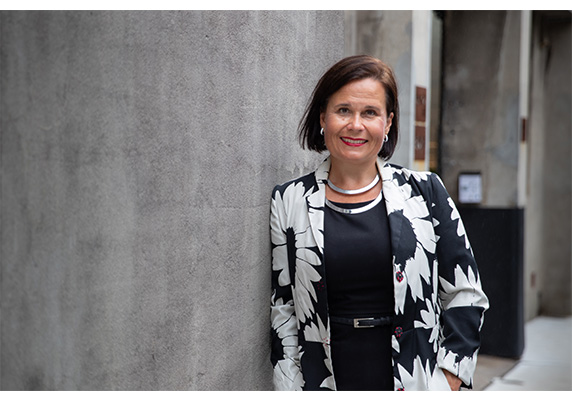Where more senior colleagues sponsor talented women keen to progress in the legal profession, there are benefits to both parties and increased retention in the legal profession.
Katriina Tahka, a highly experienced chief executive officer, Board chair and human relations expert, still recalls the horrifying experience she had over 20 years ago that proved to be a catalyst for her dedicated activism for gender equality in employment.
“At my first ever interview for a grad role, the male partner interviewing me asked me, ‘Why the **** should I hire you? You’re going to get knocked up and have kids.’ The female HR manager sitting next to him said nothing. At the time, I was too stunned and powerless to say what I should have said in response. And people wonder why I focus on gender equality now,” Tahka recalls.
Though her executive roles over the last two decades have differed between organisations private and public, Tahka’s guiding intention remains consistent: cultivating diversity, inclusion and opportunity for women, people of colour, and those who are underrepresented in the law and human resources sectors.
Tahka and Dr Natalie Galea founded Cultivate Sponsorship in 2018 in response to Dr Galea’s research into the systemic obstacles for women in the construction industry. The glaring disproportion in the numbers of men achieving leadership and promotions in comparison to the numbers of women of equal experience and education seemingly resulted from a lack of sponsorship for women. Dr Galea’s research indicated that businesses with sponsorship programs instituted by senior management, recognising and supporting emerging female leaders, enable talented women to overcome cultural and systemic barriers to career progression.
The numbers tell the story
For the first time in Australian history, women lawyers outnumber men in every state and territory. Of the 83,643 solicitors working in Australia, 53 per cent are women, according to the Law Society of NSW’s 2020 report into the law industry in Australia. The 2021 Annual Profile of Solicitors indicated that in NSW, there were 19,917 female and 17,269 male solicitors, a 6 per cent increase in the number of women since 2020, against a 2 per cent increase for men.
It shouldn’t surprise anyone working in the industry, since there’s been a 67 per cent growth nationally in the number of female solicitors over nine years, far outpacing men (26 per cent). Women outnumber men across government, community, and corporate legal sectors. At 48 per cent, however, they still remain underrepresented in private practice. More than half of all female solicitors (52 per cent) have been admitted for 10 years or less compared to about a third of all male solicitors (38 per cent). The overrepresentation of younger female solicitors compared to younger male solicitors is further evidence that women are dropping out of the profession mid-career, which represents a major loss of knowledge and experience to the industry.
Despite a vast increase in the number of women entering the profession, female legal professionals still face barriers to leadership, prejudices within their workplaces and outside them.
Despite a vast increase in the number of women entering the profession, female legal professionals still face barriers to leadership, prejudices within their workplaces and outside them, and battles to access parental leave, education, flexible work arrangements, and the reality of bullying, harassment and discrimination.
Recognising these battles as a shared challenge enables women to appreciate that they are not alone. There are solutions, remedies and a shared resolve when women find a sense of community within their practice, their sector, or within the law industry nationally.
Though more than half of Australia’s solicitors are women, the average age of women in the legal industry is lower than that of male solicitors. Simply put, the law is attracting graduates and new talent, but is not providing the environment and incentives for women to stay, and progress, as solicitors.
Dr Galea and Tahka both have experience as lawyers and maintain friendships within the industry. It was evident, from their own experience and anecdotally, that the legal industry did, and does, struggle to address a number of shortfalls in achieving fairness, transparency and gender equality.
They found that many female lawyers and people of colour felt stymied by an antiquated system reliant on billables, being present in the office for long hours (and having to accept working beyond set hours), and a lack of empathy for the additional roles women fulfil as carers.
“There are definitely fewer women in leadership in law. It’s because it’s difficult for women to balance care and responsibilities and senior legal roles,” explains Tahka. “I’ve heard comments made in the workplace assuming that a woman won’t move locations or take on a promotion because she’s got kids. That has an enormous impact on women’s careers when held back by perceptions not based in reality.”
Support for my ambitions
Darshana Parekh, Head of Partnerships at Cultivate Sponsorship, recalls that early in her career there was little support for her ambitions as a young, female lawyer while her male colleagues were rewarded with accolades and promotions.
“I started my career as an insurance litigator. Certain behaviours, such as peacocking, showmanship and bullish speaking styles with no regard for others, were rewarded, which did not sit with my values.”
“The people in the industry predominantly looked and sounded the same: all white men, the majority of whom were ignorant to the fact that they belonged to the most privileged species in the world.” It wasn’t until Parekh’s mentor took on the role of a sponsor that she was able to leverage his established knowledge and networks.
“This led to access to like-minded individuals, offerings to attend seminars and eventually, a role on a national legal association’s DEI committee.”
A second sponsorship with a former lawyer that she had met at a networking event led to even greater opportunities.
“We developed a relationship, and through her advocacy I was able to raise my profile. She advocated and encouraged me to speak at various legal seminars in Sydney and because of her I’ve been a panellist speaker with the Legal Innovation Festival, Women on Boards and LegalWise Seminars.”
Mutual benefits
Tahka notes that sponsorship can redress the loss of talented mid-career women solicitors from the industry. “The model involves partnering an experienced and senior level sponsor with a sponsee who has proven talent, qualifications and the desire to sustain an ongoing career in law. The benefits of this partnership are mutual. The sponsee, obviously, has guidance in the skills they need to foster and access to knowledge and the experience of an industry veteran, while the sponsor earns a greater understanding of how their workplace is viewed by newer staff and the personal and professional challenges faced by their staff within work hours and outside it, and they are challenged to consider different ways of working and whether these could be effective (such as flexibility to work remotely, providing return-to-work support for women who have been out of the industry for a year or more, or partnering new staff with a mentor).

“As an example, in an engineering firm where one of the sponsees was their legal counsel, through the program she shared that she was interested in moving into other parts of the business in general management, but historically those jobs have gone to other engineers. She articulated that to her sponsor, and he created a situation where she was put forward for a non-legal management role and she got it. He supported and backed her. Having a sponsor say ‘she’s got the core skills, I know her, I’ve worked with her’ opened the door and gave her the confidence to do it.”
The biggest positive with sponsorship is retention, says Tahka. “This process helps to retain people. It’s a big loss to a firm when you lose someone who has five to seven years of experience, but that’s when people start looking at other options.”
More focus on retention
Sydney-based Kathryn Dent began work as a lawyer in 1994, being promoted through roles in different firms to Senior Associate, Director (of incorporated legal practices) and now Partner at HWL Ebsworth. Since graduating, she has been in private practice. “There is much more of a focus now, compared to when I began, on retention of women in the profession, particularly in ensuring that women who have taken time out of their career for child-care and family responsibilities return,” she observes. “There is also a focus on ensuring that women are afforded the same opportunities for promotion and a need to ensure that they are elevated, on merit, into senior ranks within the profession. The retention and elevation of women into senior positions has been facilitated by the proliferation and use of technology and flexibility of work arrangements, both of which have advanced; and during COVID this has happened more rapidly.”
Dent’s experience has been significantly more positive than many other women’s experiences in private practice, largely due to the support of her colleagues and partners.
“I have not really had any scarring experiences as a woman in law and I appreciate I’m very fortunate in that regard as I am acutely aware that the statistics of, for example, sexual harassment and bullying in the profession is sadly too high. I was promoted to each of my positions within a short period of time and have been lucky to work in firms that have been progressive as regards women and egalitarian. If I felt on occasion uncomfortable about any experience I was having with colleagues or clients, which was by no means any misconduct of a serious nature, then I was fortunate that the partners that surrounded me and the human resources departments were receptive to the conversation and supportive.”
While Dent is not engaged in a formal mentoring program, she is confident that she is a role model by example to the other women in her firm and in the industry more broadly. It is her belief that proving a senior law partner can also care for her family and spend quality time with her children is important for others to see.
“I feel a strong responsibility to be open and transparent with my colleagues about my personal life so they can see the way I operate, practise and combine that with children and family. I am by no means suggesting that what I do or how I do it is perfect and I fully appreciate that the life choices I have made will not be life choices that other female lawyers want to make, but I do want to lead by example in that I am showing it is possible to be a female partner in a law firm with a very full and active family life and that I have not sacrificed my professional satisfaction or development.”
Dent is part of a Facebook group that she finds supportive and informative, “Lawyer Mums Australia”, in which members share experiences and advice both regarding their work and their personal lives.
Diversity, be it in gender, race, age, ability, background is tremendously important, not only for insiders in the industry, but also for the clients and the justice system holistically.
“I am in awe of many females in the legal profession in Australia and find it almost impossible to single anyone out as particularly impressive,” she says. “I am emboldened by the female composition of the High Court Bench, including having a female Chief Justice, and a former female judge being appointed to the role of Governor of NSW. As an employment lawyer I’ve admired the important work that Elizabeth Broderick, Kate Jenkins and Kate Eastman have done in their countless hours of inquiries and reports on sexual harassment, which have led to broader public awareness as well as significant industry and legislative change. But then there are also many female colleagues past and present and peers whom I am impressed by and take inspiration from, many of them members of Lawyer Mums Australia, and some of whom have been in more junior positions than I have.”
The value of diversity
Diversity, be it in gender, race, age, ability, background is tremendously important, says Dent, not only for insiders in the industry, but also for the clients and the justice system holistically.
“I’m a very strong believer in ‘you can’t be what you can’t see’, so diversity is important in attracting and retaining females in the law. The quality of our legal system directly correlates to the trust the public has, and diversity is an important factor in that because it gives people choice in their engagement of the right lawyer for their work and needs. Diversity also ensures that different perspectives are taken into account in the application of the law and are representative of the population as a whole.”
As positive as Dent’s experience has been, this is not the case for many women, and Tahka is determined to be part of a revolution in the way metrics of success are viewed. Rather than billable hours being the gold standard of success, she wants leaders to be measured by the number of staff they invest time and funds into educating and promoting within their workplace. In her view, the benefits to firms in investing in women’s career longevity extend beyond measures of gender equality.
“If firms see this as something that retains talent, rather than purely as gender equality, the financial returns on reducing attrition rates make it worthwhile as a people investment.”
Parekh reflects on the impact that her sponsors – male and female – had as gamechangers in her career achievements.
“Without my two sponsors working behind the scenes to help me amplify my voice, I believe it would have taken me longer to become vocal about gender and people equality within the legal industry. Because of their belief in me, I have evolved into a stronger and empathetic leader. I’m now in the fortunate position to help other female lawyers, particularly women of colour like myself, when they reach out for career advice.”




